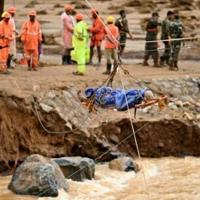Experts stated that climate change significantly contributed to the devastating landslides caused by torrential rains in India last month, resulting in the loss of over 200 lives. The scientific community known as World Weather Attribution revealed that the intense rainfall was a direct consequence of global warming.
The state of Kerala faced severe monsoon rains that led to landslides in the Wayanad district on July 30, trapping residents and homes under tons of debris. According to the analysis by 24 scientists, the heavy rainfall was made 10 percent more severe due to human-induced climate change.
The group emphasized that before the impact of climate change, such heavy downpours were rare in Kerala. The researchers linked the increased moisture in the atmosphere to rising temperatures caused by fossil fuel emissions.
Moreover, the depleting forest cover in the Wayanad region increased the vulnerability to landslides by reducing slope stability. The scientists underscored the urgency of addressing climate change, as they predict that heavier rainfall events will lead to even more catastrophic outcomes.
India, as one of the largest greenhouse gas emitters, aims to achieve net zero emissions by 2070. However, the country’s heavy reliance on coal for energy production remains a significant challenge in combatting climate change.
The experts warned that the risks posed by climate change will continue to escalate unless swift action is taken to transition to renewable energy sources. The recent landslides in Wayanad serve as a poignant example of the real-time impact of climate change on communities.
ash/pjm/fox





